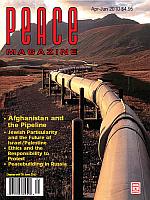
Peace Magazine Apr-Jun 2010, page 31. Some rights reserved.
Search for other articles by PMag staff here
Homicides in Venezuela have quadrupled during President Hugo Chavez’s 11 years in power, with two people murdered every hour, according to new figures from The Venezuelan Observatory of Violence (OVV). That nation has one of the highest crime rates on the continent, with 54 homicides per 100,000 citizens in 2009. “The problem is not so much the criminals, but rather the government’s inaction and lack of policies,” OVV director Roberto Briceno Leon told Reuters.
Source: Reuters
The Russian State Duma Speaker Boris Gryzlov said on March 16 that the Duma would not ratify the new strategic arms treaty with the United States if it does not include an explicit link with missile defence.
“State Duma deputies participate in the drafting of the STARTII treaty. We will not ratify it if it does not take into account the link between strategic offensive weapons and missile defence,” said Gryzlov.
For a while the United States had seemed willing to abandoned its planned installation of missile defence systems in Eastern Europe, but now may be backtracking. Russia wants to make the START treaty conditional upon foregoing such plans.
Source: Interfax.
Cases of homegrown terrorism are becoming more frequent, including one middle-aged woman, Colleen LaRose, who became involved through her computer.
The Internet has become a crucial front in terrorism. According to Fawaz A. Gerges, a terrorism expert at London School of Economics, “The terror training camps in Afghanistan are being replaced by virtual camps on the Web.”
From their side law enforcement and intelligence agencies are scrambling to monitor the Internet and penetrate radical websites to track suspects, set up sting operations, or unravel plots before they are carried out.
Source: Los Angeles Times
President Obama’s call for a nuclear weapons-free world in Prague unleashed an outpouring of support from international allies and activists. One surprising new initiative has come from NATO allies: Belgium, Germany, Luxembourg, the Netherlands, and Norway. They have called on NATO to review its nuclear policy and remove all US nuclear weapons currently on European soil under NATO’s “nuclear sharing” policy. Despite US insistence on strict adherence to the Nuclear Non-Proliferation Treaty (NPT), which prohibits the transfer of nuclear weapons to non-nuclear weapons states, several hundred US nuclear bombs are housed in Belgium, Germany, the Netherlands, Italy, and Turkey.
The five governments, under domestic pressure, have put NATO’s nuclear policy on the agenda for an April strategy meeting in Estonia.
Japan also has called for faster progress toward nuclear disarmament. The new Democratic Party government, which came to power after 60 years of one-party rule, has announced to the US that it no longer upholds the pro-nuclear advocacy of previous Japanese officials. Foreign Minister Okada has asked the US to declare that nuclear bombs would only be used for the “sole purpose” of deterring a nuclear attack.
Such a declaration would change the US policy. The Clinton and Bush administrations have stated the possibility of using nuclear weapons against the threat or use of chemical, biological, or conventional forces.
Further, over 200 Japanese parliamentarians wrote to Obama stating that, contrary to the statements of US hawks, Japan would not seek to possess nuclear weapons if the US were to declare a “sole use” limitation on its nuclear arsenal.
These promising anti-nuclear positions are occurring while the new nuclear posture review is being prepared for presentation to Congress. It was scheduled for release in January but has been delayed several times, reportedly because of conflicts among the drafters and the president’s own dissatisfaction with the most recent version, which promotes the status quo. Secretary of Defence Robert Gates and Secretary of State Hillary Clinton are among those defending the existing nuclear policy.
Russia’s Foreign Minister Sergei Lavrov expressed concern that NATO’s assertion of a right to use military force globally violated the UN Charter. Russia views as threatening the US plan to establish missiles in Bulgaria, Poland, and Romania, with a missile command centre in the Czech Republic.
Nevertheless, there is momentum behind the calls to abolish nuclear weapons. Crowds will attend the NPT Review Conference in May.
Source: Alice Slater, Nuclear Age Peace Foundation.

Peace Magazine Apr-Jun 2010, page 31. Some rights reserved.
Search for other articles by PMag staff here